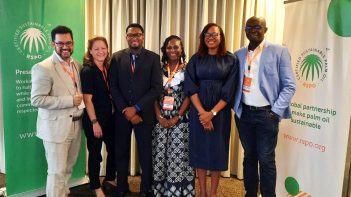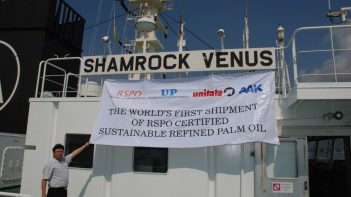Independent palm oil smallholders under the Makarti Village Cooperative (KUD) in Jambi know full well how difficult breathing can be and how palm oil quality could decline because of haze. In response, they are intensifying efforts to ensure land and forest fires do not touch their plantations.
For more than two decades, forest fires have become an annual problem in Indonesia. The land and forest fires raging across eight provinces between June and October 2019 were estimated to cause USD5.2 billion (around Rp82 trillion) of damages, equal to 0.5% of Indonesia’s gross domestic product, according to the World Bank.
Members of KUD Makarti, certified by the Roundtable on Sustainable Palm Oil (RSPO) in August 2019, attended a training on plantation practices without the use of fire. They also put up banners to remind fellow smallholders not to use fire when managing their plantations. The cooperative does not shy from warning and even acting upon members who violate the rules.
"If warnings don’t work, then there’s no other way than sanctioning them by terminating their membership of the certification,” said Sufyan Suhari, Secretary at KUD Makarti in Sidomukti Village in Muaro Jambi District. If they continued to violate the rules, the cooperative could also report them to the authorities, he added.
Haze from land and forest fires in South Sumatra, a neighbouring province only 10km away from Sidomukti Village, covered the village for a month in 2015. The smog blocked the sun, accelerating the ripening of palm oil fruit bunches.
"The quality of FFB (Fresh Fruit Bunches) is of course different. The FFB will not be at its peak weight,” said Sufyan by phone in early April 2020. “Others do the burning, but we suffer from it.”
The ban on the use of fire as a way to prepare land is a key criteria of RSPO standards, including the RSPO Independent Smallholder Standards adopted in November 2019. With this special standard for independent smallholders, the certification process has become simpler. Aside from not using fire on land, independent smallholders also commit to no burning to manage waste and pest control.
"They (independent smallholders) now understand that fires are not simple, and that fires in one place can spread to other places quickly, especially those close to flammable peatlands”, said RSPO Indonesia Director Tiur Rumondang. “No burning practices avoid legal risks as well as the impact on human health. This is part of RSPO’s modules and training,” she added.
No RSPO certified independent smallholders experienced fires in 2019, according to the organisation’s records. The RSPO’s Geographical Information System (GIS) team monitors hotspots – or suspected fires – within and around the concessions of RSPO members on a daily basis. If a hotspot is found, RSPO will inform all affected parties to do ground checks.
The use of fire to prepare land in palm oil plantations is influenced by socio-economic factors, including the extension services (government-funded trainers), level of knowledge, and organisational participation, according to a research by Tanjungpura University, Riau University, and Lambung Mangkurat University in Indonesia. The study, published in 2018, took samples from the West Kalimantan province. One of its recommendations was to strengthen information on fires from extension workers in the villages.
Sugiyarno, Manager of the Tenera Smallholders Group in Katingin Hilir, Central Kalimantan Province, embraced this role. He assists the local Environmental Agency in promoting the dangers of land and forest fires.
"I am a volunteer extension service worker, we talk to neighbouring smallholders to prevent fires,” Sugiyarno said.
As a group manager, Sugiyarno is tasked to coordinate and monitor independent smallholders in plantation practices, including to ensure that no fire is used. Members of the group work on the plantations together, block by block, to ease the burden of individual smallholders. Tenera, with its 35 members and a total size of 223 hectares, has been RSPO certified since February 2018.
The Indonesian Government has also regulated land opening using fires under several laws on forestry, the environment, and plantations. There are prison sanctions and fines for those who clear land by burning. To accommodate traditional practices of slashing and burning, there are exceptions with strict requirements. According to the Environmental Protection and Management Law, fires may only be used by those with a maximum size of two hectares per family and the land must be utilised to cultivate local varieties, and in burning, the area must be surrounded by firebreaks to prevent the fire from spreading to surrounding areas.
"No farmers dare to deliberately burn now, they fear the consequences from the government,” said Sugiyarno.
Keep reading

RSPO hosts first Africa downstream sustainable palm oil supply chain forum in Cape Town

Nearly two decades on, Europe continues to drive global demand for RSPO Certified Palm Oil

Communicating Sustainable Palm Oil - examples of success across Europe
[EOT] Terms of Reference: Independent Smallholders Outreach Programme in Indonesia

RT2023 Delegates Propose Solutions to Reinforce RSPO’s Assurance System – End-Year Highlights of Assurance Standing Committee
RSPO UK Members' Day Examines Shifting Dynamics of Doing Business within Europe

Celebrating 20 Years of RSPO’s Sustainability Journey




